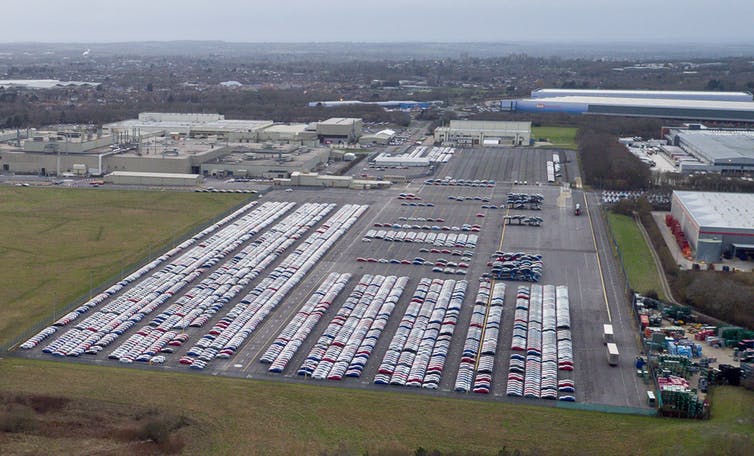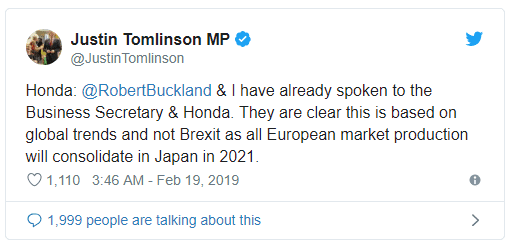This article by Jim Saker was previously published on theconversation.com
Britain’s car industry has faced a barrage of bad news in 2019. Honda is the latest casualty, announcing it will close its Swindon car plant, which employs 3,500 people, in 2021. It follows notice from Nissan that it is withdrawing investment from its Sunderland plant and the announcement of job cuts by Jaguar Land Rover and Ford.
There are lots of reasons for this retrenchment. Globally, there has been a stall in car sales combined with a glut in production. Then there’s the turn against diesel – once seen as a climate-friendly alternative to petrol. The VW emissions scandal has seen sales of diesel cars plummet.
So there are clearly bigger, longer-term trends at play than Brexit. But, for the UK car industry specifically, there are no positives in Britain leaving the EU. What’s more, the government’s handling of Brexit is making it easy for global car manufacturers to decide to leave the UK.

Honda’s Swindon plant. Ben Birchall/PA Wire/PA Images
How did we get here?
Japanese cars first came to Britain in the 1970s when demand started to surge. With the domestic car industry unable to increase production and meet this demand, Datsuns (now owned by Nissan) became popular – not least because of their superior build quality.
Japanese carmakers went on to establish a position in the market in the UK and across Europe and opened purpose-built plants in the UK, which became some of the most efficient in the world. When Margaret Thatcher was prime minister in the 1980s she promoted Britain as a gateway to Europe. Honda set up shop in Swindon and Nissan in Sunderland to avoid the 10% tariff on car imports from outside the single market.
Honda’s announcement that it is closing its highly efficient Swindon plant is a fascinating, albeit sad, example of how companies and politicians attempt to rationalize their decision-making. Honda has come out and said that Brexit was not the cause of the decision to close the plant in 2022. This has been jumped on by Brexiters attempting to either justify their position on leaving the EU or distance themselves from the ongoing negotiations taking place over the terms of Britain’s exit. But it’s incredibly hard not to see this decision, at this time, as a consequence of Brexit.

With Theresa May refusing to rule out a no-deal Brexit, it is incredibly difficult not to see it as a major factor pushing Honda to this conclusion. Honda is intent on developing its electric car range and is currently faced with the decision of where to do it. Why not do so at its existing factory? Swindon is based on the M4 corridor, which includes the towns of Reading and Bracknell, an area often described as Briton’s Silicon Valley – so the technology infrastructure would undoubtedly be available.
But a UK outside of the EU is not an attractive option for future investment, especially as Japan now has its own trade deal with the EU, which includes the phasing out of tariffs on cars over the next eight years. This is a benefit that will not include the UK if there’s a hard Brexit, which is still a possibility. So this uncertainty over the Brexit negotiations makes Honda’s decision totally logical.
Read more: UK’s post-Brexit trade with Japan in jeopardy while uncertainty persists
It is also why Japan’s politicians have pressed for a soft Brexit ever since the referendum result. This has been increasingly vocal as the Brexit date approaches. Shinzo Abe, the Japanese prime minister, has told Theresa May that the “whole world” wants to avoid a no-deal Brexit in January.
As well as Honda and Nissan, Toyota is the third big Japanese carmaker with UK operations. It has not made any Brexit-related announcements yet and this could be linked to the fact that it has concentrated on hybrid technology since launching the Prius in 2000. This means it has been more immune from shifts in environmental thinking and has just launched the production of the new Corolla at its Burnaston plant in Derbyshire. Toyota has said that decisions are not being made beyond the next five to six years.
So despite attempts to downplay Brexit as the reason for the break up of motor manufacturing in the UK, there is ample evidence that Brexit – and the uncertainty that dogs the UK’s future relations with Europe – is the last straw. Carmakers across the world face myriad challenge to stay profitable; they don’t need Brexit to add to their troubles.
This article by Jim Saker was previously published on theconversation.com
About the Author:
Professor Jim Saker is the Director of the Centre for Automotive Management and a long-standing Professor of Retail Management with a close working relationship with the automotive sector.
He has been involved with the automotive industry for more than 20 years and was a co-founder of the MIRA Business Unit in 1992. He is often found in the Automotive Industry Power 100, a listing of the top most influential people in the sector, and he is a member of the UK Government’s Leadership and Management Panel. He has been elected as a Life Fellow of the Institute of the Motor Industry for his contribution to motor industry education.
Professor Saker’s research interests lie in the area of channel power relationships and strategic developments in the motor industry.
Featured Image Credits: Pixabay





